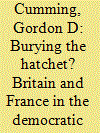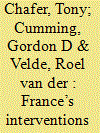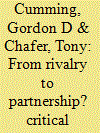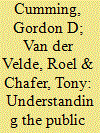|
|
|
Sort Order |
|
|
|
Items / Page
|
|
|
|
|
|
|
| Srl | Item |
| 1 |
ID:
108607


|
|
|
|
|
| Publication |
2011.
|
| Summary/Abstract |
Against the background of conflict in the Great Lakes Region, the UK and France promised, at their 1998 Saint-Malo summit, to set aside rivalries and cooperate on Africa. In subsequent Anglo-French gatherings, they singled out the DRC and pledged to work together there to promote peace and tackle poverty. This article asks whether this coordination took place and whether it involved a 'deconflictualisation' of approaches, 'coincidental' cooperation, or 'sustained and reciprocal' collaboration. It looks for evidence of institutionalisation of UK-French ties and policy cooperation in the fields of peacebuilding and poverty reduction. It then identifies the pressures for, and barriers to, collaboration, focusing particularly on the role of interests, foreign policy norms, institutional factors and resource constraints. It concludes by setting out the wider implications of UK-French cooperation and the limited prospects of closer future collaboration.
|
|
|
|
|
|
|
|
|
|
|
|
|
|
|
|
| 2 |
ID:
171707


|
|
|
|
|
| Summary/Abstract |
France’s interventions in Mali and the wider Sahel appear to mark a new departure in French military policy in terms of the approach to multilateralism adopted, the regionalisation of the response, and the levels of violence deployed. Yet how ‘new’ is this approach, when set against the historical backdrop of French military interventions in Africa? Should it be seen as a modified version – an adaptation – of the new type of multilateral engagement that emerged in the wake of the 1994 Rwandan genocide? Using a historical institutionalist lens, employing the notions of critical junctures, ‘layering’, and ‘drift’, this article briefly sets out the unilateral approach that marked French military policy in Africa prior to 1994 before going on to analyse the multilateral approach and associated path-dependent practices that emerged after the Rwandan genocide. Drawing on elite interviews in Europe, the US and Africa, the article shows that, while France’s engagement in the Sahel is characterised by an ostensibly novel multilateral approach, it does in fact combine new and old norms, ideas and practices.
|
|
|
|
|
|
|
|
|
|
|
|
|
|
|
|
| 3 |
ID:
108509


|
|
|
|
|
| Publication |
2011.
|
| Summary/Abstract |
At the December 1998 Saint-Malo summit, Britain and France promised to set aside past rivalries and work together on African issues. While brief indications were given as to possible areas of bilateral and 'bi-multi' cooperation, the terms and scope of this 'partnership' were not spelt out. Was this to involve only sporadic collaboration? Or was it to be an institutionalised partnership, such as the Franco-German tandem, or perhaps a more intuitive alliance, such as the Anglo-American 'special relationship'? These questions are central to this article, which begins by showing how Anglo-French relations in Africa were largely marked by rivalry from the colonial era to the early post-Cold War period. Drawing upon extensive interviews, it demonstrates how, over the last decade or so, closer linkages have developed between the UK and French administrations and how there has been a greater degree of cooperation in response to the key challenges of Africa. It then uses a neo-classical realist framework to explain the readiness or reluctance of Britain and France to collaborate on Africa. It concludes by suggesting that, while there has been progress in 'deconflictualising' African policies, cooperation has been, and is likely to remain, limited.
|
|
|
|
|
|
|
|
|
|
|
|
|
|
|
|
| 4 |
ID:
187504


|
|
|
|
|
| Summary/Abstract |
Strategic narratives now face unrealistic expectations as to what they can achieve in the military field. This article asks when and how such narratives lose traction during protracted military interventions. To address these questions, which are crucial at a time when so much modern warfare takes place in the “fourth” dimension, this study develops a conceptual framework that focuses initially on the weakening of a narrative’s content and, subsequently, on its loss of normative resonance and verisimilitude. The latter two factors are beyond the control of even the most skilful strategic narrator, particularly where narratives are required to appeal to audiences with different norms. Our framework is applied to the case of France’s military operations in Mali (Serval) and the Western Sahel (Barkhane). It finds that, whereas France’s compelling Serval narrative was congruent with strong French and Malian public backing, its Barkhane narrative weakened over time, resonating less with prevailing societal norms, becoming less attuned to events on the ground and ultimately coinciding with a sharp decline in public support in France and Mali. It concludes that strategic narratives afford agency to policymakers but are constantly open to contestation and struggle to cope with diverse audiences and deteriorating “evenemential” contexts.
|
|
|
|
|
|
|
|
|
|
|
|
|
|
|
|
|
|
|
|
|